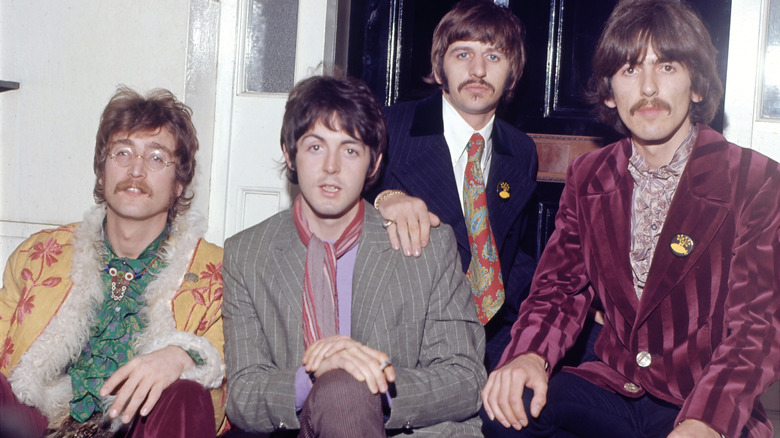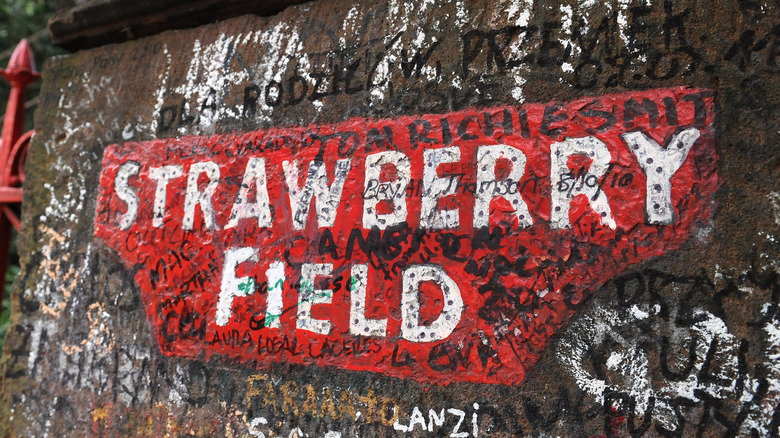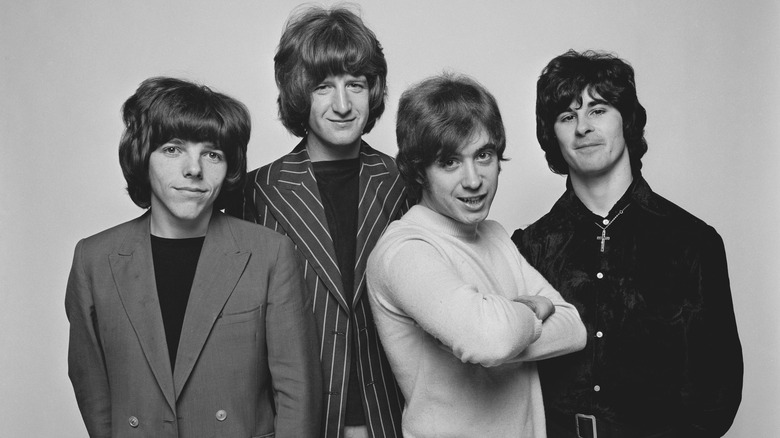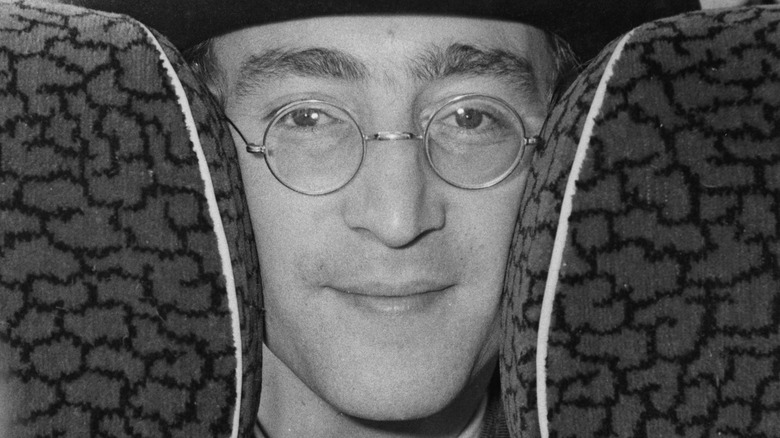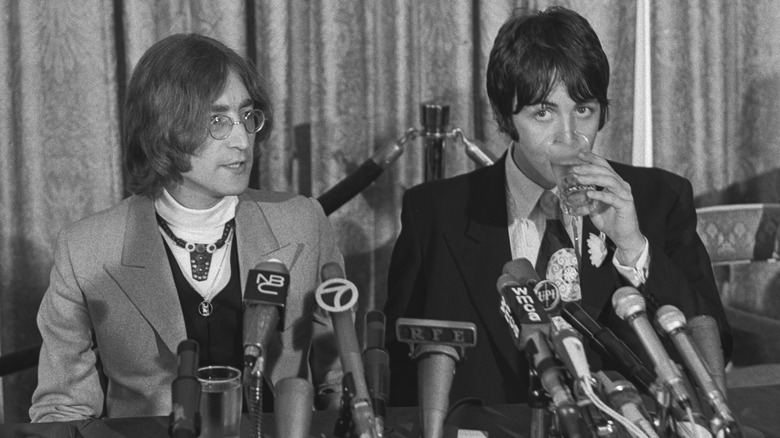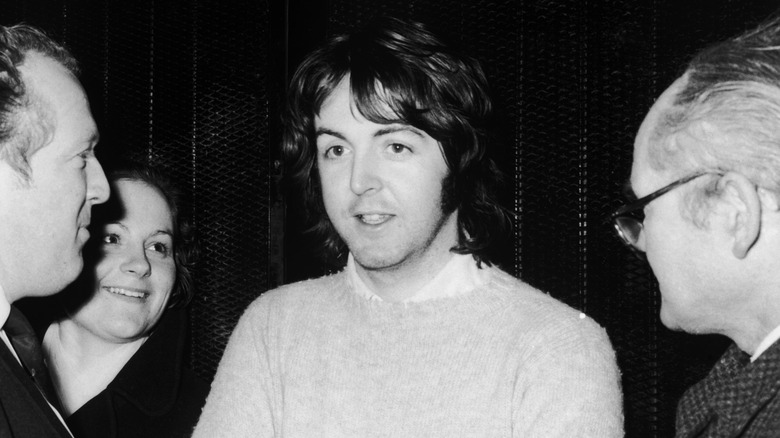The History Of The Beatles Song Glass Onion Explained
2019's "Knives Out" offered some deep-cut fan service to readers of the "Choose Your Own Adventure" book series by naming Christopher Plummer's character Harlan Thrombey, just like the rich old man whose murder you have to solve in "Who Killed Harlowe Thrombey?" Now it appears that writer and director Rian Johnson is paying tribute to another classic in the title of the next "Knives Out" film, one that isn't anywhere as niche as "CYOA," especially if you're a fan of all things musical.
As you may have figured, the classic in question is a Beatles song, and the name of the upcoming film is "Glass Onion: A Knives Out Mystery," which will be dropping on Netflix right before Christmas, on December 23, 2022. Once again, Daniel Craig will be headlining a powerhouse cast, reprising his role as detective Benoit Blanc as he tries to solve yet another head-scratching murder mystery. But what about the song that's found its way to the name of the movie?
As Johnson explained (via Netflix Tudum), he came up with the name "Glass Onion" firstly because he's "always fishing for something fun that Blanc can grab onto as an overwrought metaphor that he can beat to death." Coming up with "glass" as the first word, he searched his music library for good songs that featured the word, and he went with "Glass Onion" as a nod to his Beatles fandom. We'd say he made a great choice, and much of it is because "Glass Onion" — the Beatles song, not the film — has quite an interesting backstory.
The Beatles' most self-referential song ever
Ever watched an episode of a TV series that deliberately calls back to various events in the show's canon, either as a means of fan service, a way of furthering the episode's narrative, or both? The Beatles' 1968 track "Glass Onion" is just like those episodes, only in song form. The song appears as the third track in Vol. 1 of the Beatles' "White Album," offering a quick (2 minutes, 17 seconds) burst of aggression after the far more reflective, slower-paced "Dear Prudence."
The lyrics of "Glass Onion" start out with the figurative guns blazing, with John Lennon singing about what was then a very recent hit — 1967's "Strawberry Fields Forever" — and the middle lines of its chorus. The second verse references another song from "Magical Mystery Tour," "I Am the Walrus," with the declaration "the walrus was Paul" prefacing a quick mention of one of the Beatles' Paul McCartney-fronted hits, "Lady Madonna." If you're counting with us, that's three references to previous Beatles songs in the first half alone.
After a brief instrumental break punctuated by Lennon's increasingly frantic declarations of "oh yeah," the song continues exploring the Beatles' recent discography by calling back to a third "Magical Mystery Tour" track, "The Fool on the Hill." Next, there's the line "fixing a hole in the ocean," which doesn't actually appear on the song "Fixing a Hole" but is nonetheless a reference to the "Sgt. Pepper's Lonely Hearts Club Band" tune.
Five Beatles song references in just 137 seconds. One can only imagine how far Lennon might have gone had he made "Glass Onion" about a minute or two longer.
Glass Onion: What's in a name?
Before we dive into the lyrical intricacies of "Glass Onion," it's worth taking a look at how the song's title came about in the first place. Although the Beatles had long started getting cryptic with their song titles at the time of the making of the "White Album," "Glass Onion" is arguably the most befuddling of all the 30 song titles on the double album. Yes, even more so than "Everybody's Got Something to Hide Except Me and My Monkey."
According to Beatles Bible, the title was suggested by the Swansea-based band the Iveys (pictured above), who were signed to the Fab Four's Apple record label in 1968. The name may not ring a bell except to die-hard classic rock aficionados, but the Iveys would later change their name to Badfinger and release their share of largely Beatles-influenced songs, including "No Matter What," "Come and Get It," "Baby Blue," and the original version of "Without You."
As it turned out, the would-be Badfinger did more than just perform what would become Walter White's death song on "Breaking Bad" and write a song that became a mega-hit for Harry Nilsson in the '70s and Mariah Carey in the '90s. They came up with a song title that John Lennon ended up liking, considering how glass is transparent and onions have several layers. These characteristics lend themselves perfectly to the lyrics of "Glass Onion" ... or do they?
The songs was Lennon's clapback against pedantic fans
As explained by Beatles Bible, "Glass Onion" was John Lennon's attempt to stick it to Beatles fans who tended to overanalyze the band's songs and find meaning in every little lyric. As such, Lennon deliberately made the lyrics of "Glass Onion" ambiguous and included a number of red herrings to throw listeners off the proverbial scent. "I was having a laugh because there'd been so much gobbledegook about [the album 'Sgt. Pepper's Lonely Hearts Club Band'], play it backwards and you stand on your head and all that," Lennon told Rolling Stone's Jann Wenner in 1970.
The impetus for "Glass Onion" might have come a year or so before the song was recorded. Per uDiscoverMusic, Stephen Bayley, a student at Quarry Bank High School, where Lennon graduated about a decade prior, wrote to the musician in 1967, telling him that his class was being asked to analyze Beatles songs. A bemused Lennon wrote back, explaining, "All my writing ... has always been for laughs or fun or whatever you call it." He added that he writes songs for himself first and foremost and that everyone is free to interpret them in their own way, even if the interpretations aren't quite spot-on. "This goes for anyone's 'creations,' art, poetry, song, etc. – the mystery and s*** that is built around all forms of art needs smashing anyway," Lennon concluded.
Lennon has offered various explanations behind 'the walrus was Paul'
No red herring in "Glass Onion" is more noteworthy than the line "the walrus was Paul." According to John Lennon, the line was a throwaway that didn't really have a deep meaning to it; again, it was just there to mess with the fans. "I threw the line in – 'the Walrus was Paul' – just to confuse everybody a bit more," he explained, as quoted by Beatles Bible. "And I thought Walrus has now become me, meaning 'I am the one.' Only it didn't mean that in this song. It could have been 'the fox terrier is Paul' ... it's just a bit of poetry. It was just thrown in like that."
Separate from his comments about "the walrus was Paul" not having any deep meaning to them, Lennon later remarked that he included the line because he felt some regret about possibly quitting the Beatles, thereby making Paul McCartney the unquestioned leader of the band ... and the "walrus" in question. "The line was put in partly because I was feeling guilty because I was with Yoko and I was leaving Paul," Lennon said. "I was trying – I don't know. It's a very perverse way of saying to Paul, you know, 'Here, have this crumb, this illusion – this stroke, because I'm leaving.'"
In his 1970 interview with Rolling Stone, Lennon was also asked about the mysterious line, and he told the outlet's Jann Wenner that this was his way of thanking McCartney for holding the Beatles together amid the chaos they often dealt with.
Glass Onion and the Paul is Dead hoax
As it seems, one interpretation of "Glass Onion" is that people should just enjoy the music instead of putting the lyrics under the microscope and cooking up wild fan theories. But it was probably inevitable that due to all the Beatles song call-backs contained within, certain lyrics of "Glass Onion" would be among the many clues that purportedly backed up the theory that Paul McCartney had been dead for a few years at the time the Fab Four were working on their final studio albums.
Naturally, "And here's another clue for you all/The walrus was Paul" was singled out as one of the supposed clues in the "Paul is dead" conspiracy theory. But how could a walrus be a symbol of death? Rolling Stone broke it down in an article about the infamous hoax, noting that there were fans who erroneously believed "walrus" is Greek for "corpse," and that "I Am the Walrus" ends with a sample from a radio broadcast of William Shakespeare's "King Lear," with the character Oswald exclaiming, "O, untimely death!"
As we all know, there is no truth whatsoever to the hoax — the guy who formed Wings and sang about silly love songs is not actually named William Campbell. And John Lennon just so happened to think Oswald's line about untimely death worked well with the wild ending of "I Am the Walrus."
Yes indeed. Sometimes people can't help but look too hard through that glass onion.
